Does Creatine Have Caffeine? (Does It Stimulate?)
Author:
Unlock your full potential by engaging with our experts and community! Have questions about your fitness journey or looking for expert advice on weightlifting techniques? Don’t hesitate — leave a comment below and David Sasha Schulz will provide a personalized answer and insights to help you reach your goals.
Torokhtiy is reader-supported. Some links are affiliate links, and we may earn a commission at no extra cost to you. See our disclosure page for details.
Creatine is one of the most studied supplements. Several gym-goers (or other athletes) include it as part of their daily supplement routine. You’ve probably heard that creatine can help increase energy levels, among other benefits. But if you take creatine before bedtime and are worried about your sleep, you may wonder: does creatine have caffeine?
In this article, we’ll answer the question: does creatine monohydrate have caffeine? We’ll also explore the benefits of creatine and which is the creatine powder we recommend.
Does creatine have caffeine? Creatine and caffeine are two distinct chemicals. Creatine supplements don’t usually have any caffeine added to them. Even though creatine can help increase energy levels, it doesn’t act as a stimulant like caffeine, and it won’t keep you awake. It works by increasing energy stores in the body. In addition, creatine can also help improve muscle recovery and growth.
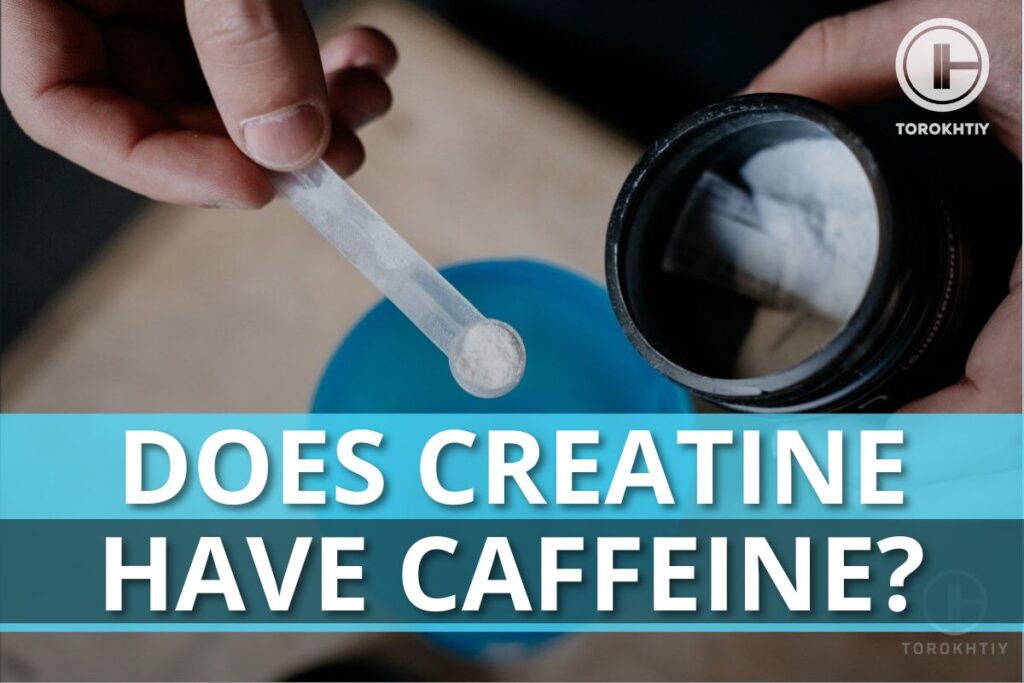
Is There Caffeine in Creatine?
No, creatine does not have caffeine. Creatine is a natural molecule found in the body made from amino acids (glycine and arginine). While you can find it in supplement form, creatine can also be found in natural sources, such as meat and seafood.
One of the benefits of creatine is increased energy. So, is creatine a stimulant?
No, creatine is not a stimulant. While it is true that creatine can increase energy levels, it does so by increasing phosphocreatine stores, a form of stored energy in the cells. As a result, you have more energy available at all times.
On the other hand, caffeine is considered a stimulant. It works by blocking adenosine, a neurotransmitter that helps the brain relax and make you feel tired. When the levels of adenosine start to build up, that is when you start feeling tired and want to go to bed.
Since caffeine works by blocking the adenosine receptors, it reduces tiredness and improves focus. It may also increase dopamine and norepinephrine levels.
Now, since creatine is not a stimulant, why is your sleep pattern messed up when take your pre-workout? To understand that, you need to check the ingredients. If the pre-workout contains caffeine, the culprit is the caffeine instead of creatine.
So, if you do not want your pre-workout supplement to affect your sleep patterns, opt for a stimulant-free pre-workout.
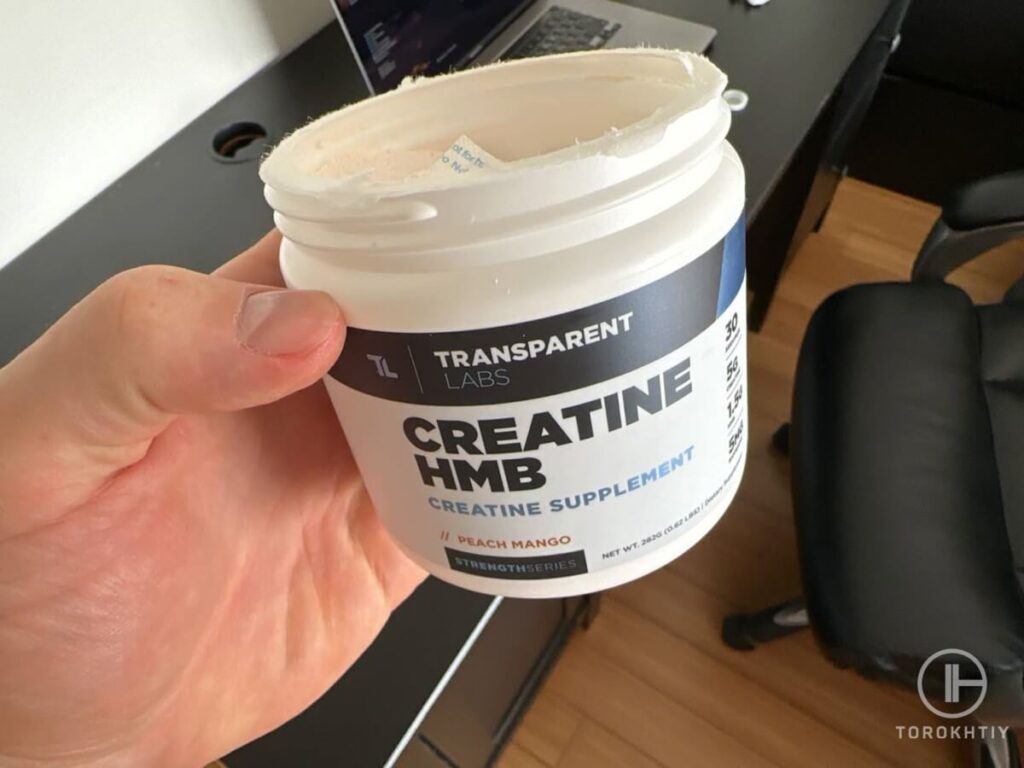
What Benefits Does Creatine Provide?
Creatine is a safe and effective supplement to take. Here are some possible benefits you may obtain when supplementing with creatine.
✅ Improved High-Intensity Exercise Performance
Since creatine increases energy availability, it can help improve high-intensity exercise performance. This means that people who perform strength training, sprints, and other sports where sudden bursts of energy are needed can highly benefit from creatine monohydrate.
In a study, people who were supplemented with creatine saw an improvement of 15% in high-intensity exercise.
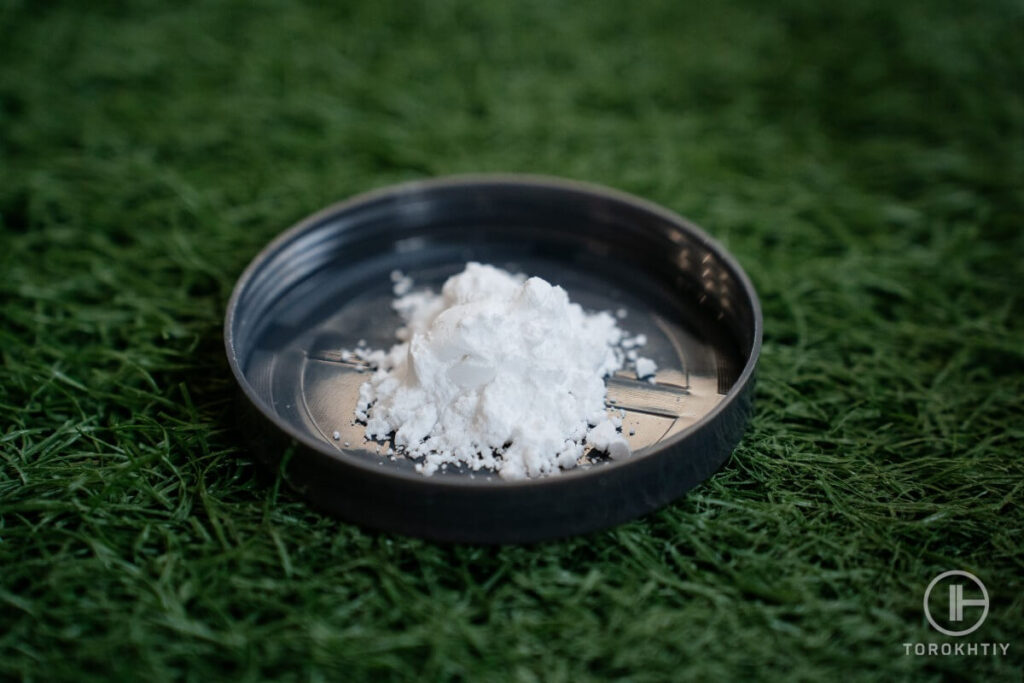
✅ Increases Muscle Growth
Most people supplement with creatine due to its effect on muscle mass. While in the beginning, the increase may be due to water increase, there is significant muscle growth after 5-7 days.
Evidence suggests that people taking creatine may increase their lean mass by as much as 4.4 pounds (2 kilograms) after taking creatine for 6 weeks.
creatine dosage calculator
Loading Phase:
Maintenance Phase:
✅ Improved Muscle Recovery
Research shows that creatine can help improve muscle recovery. It may help mitigate post-exercise damage and help you restore your energy levels faster, promoting better and faster recovery.
Keep in mind that a good post-exercise recovery requires proper nutrition. So, besides creatine, you can add a protein supplement and carbohydrate.
✅ Improved Brain Function
Creatine doesn’t only provide benefits in sports and performance. According to research, it may have a crucial role in brain function. Since it increases energy stores in the brain, it may help improve memory and intelligence.
In fact, in a study performed in older adults, those supplementing with creatine for 2 weeks had a significant improvement in memory and recall ability. It also seems to help protect against age-related mental diseases.
✅ Reduced Fatigue
Finally, creatine may help you feel less tired and fatigued. In a study, only 10% of people taking creatine experience fatigue, compared to 80% in the controlled group. In addition, creatine may also help increase energy levels when experiencing a lack of sleep and other symptoms, such as dizziness.
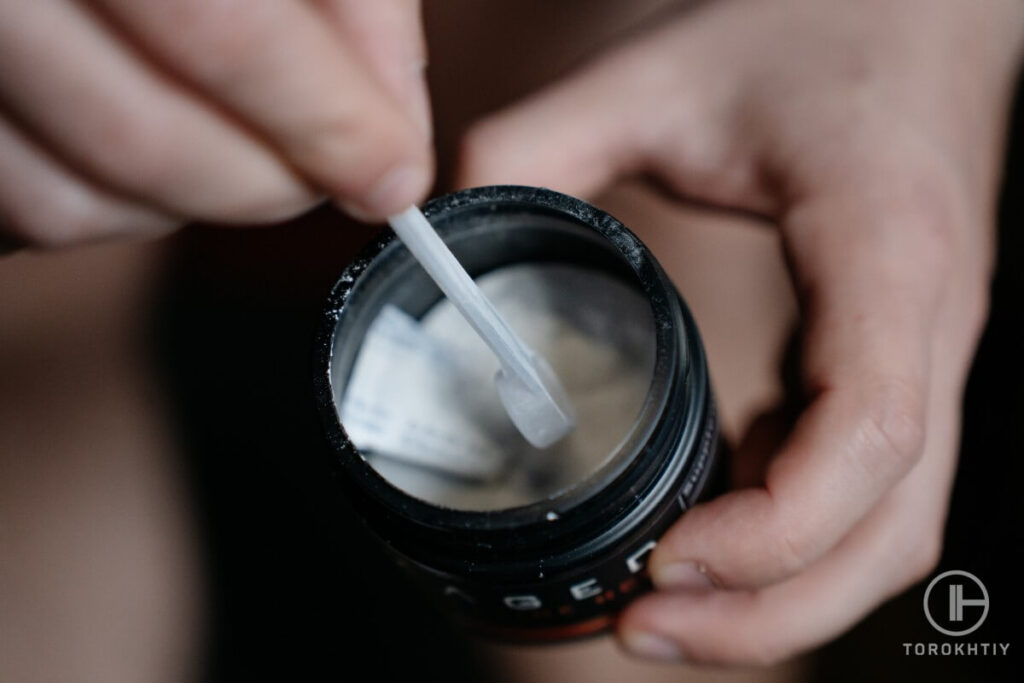
Can You Mix Creatine and Caffeine?
You can mix creatine and caffeine. In fact, mixing creatine and caffeine may be just what you need to improve your performance while working out. Creatine may help increase energy availability (when taken consistently), while caffeine can help increase focus and performance.
While there aren’t too many studies stating the benefits of using caffeine and creatine, research has found that they don’t negate its effects. This means you can safely mix creatine and caffeine at the same time.
The Creatine We Recommend
Transparent Labs Pure Creatine
- Form: Powder
- Type: Monohydrate
- Other Ingredients: HMB, Vitamin D
- Price per Serving (for 5 g): ~$1.35
- Servings per Container (for 5 g): 30 or 60 servings
- Company Founded: 2015
- Recommended by Athletes: Hafþór Júlíus Björnsson, Pat Li, P A U L I N A
If you are convinced that you need creatine as part of your supplement routine, Transparent Labs Creatine HMB is one of the best options available in the market. It has a clean formula, meaning it doesn’t have artificial sweeteners, coloring, or preservatives.
The formula comes in different flavors for you to try, such as blue raspberry, tropical punch, black cherry, peach mango, and it even comes unflavored.
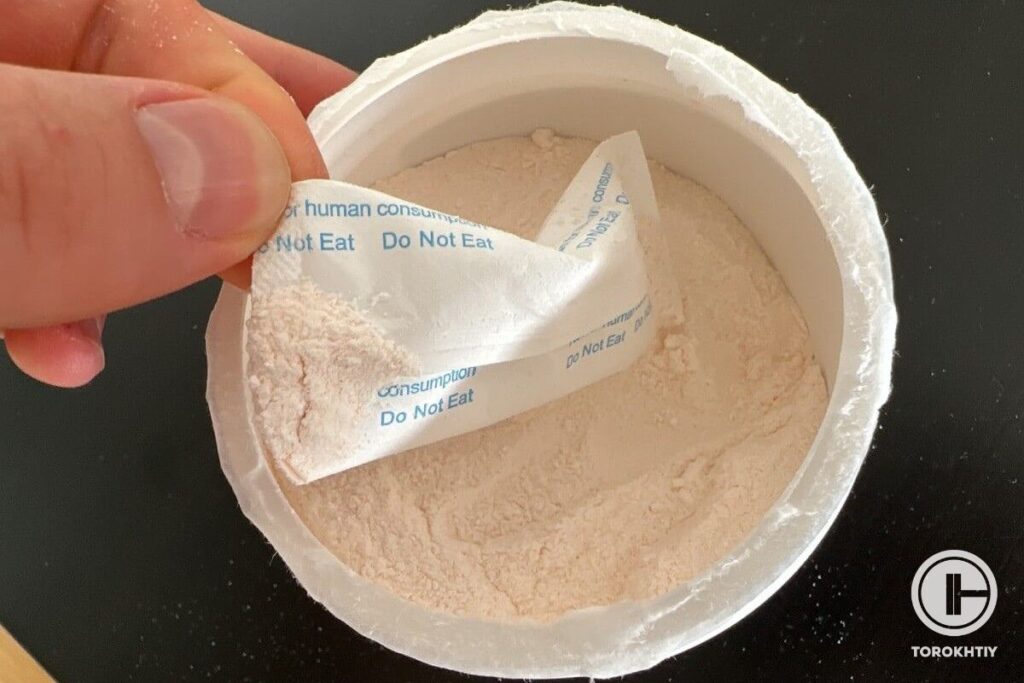
What makes Transparent Labs one of the best supplement companies is that their supplements come with an “Informed Choice” certification, meaning that if you are an athlete, you don’t have to worry about adding a supplement that may contain banned substances.
In addition to creatine, the supplement also contains HMB (beta-hydroxy beta-methyl butyrate). This ingredient may help increase strength and improve body composition. It may also help improve aerobic performance and oxygen capacity.
FAQ
Does Creatine Keep You Awake Like Caffeine?
No, creatine is not a stimulant like caffeine. This means that it shouldn’t keep you awake at night. If you have insomnia after taking your pre-workout supplement, check if among its ingredients it has caffeine. That is probably the culprit of your lack of sleep.
Does Creatine Give Energy Like Caffeine?
No. Creatine does give you energy, but it has a different mechanism than caffeine. Creatine works by increasing energy stores in the cells, while caffeine works by affecting receptors in the brain to prevent you from feeling tired.
Does Creatine Act Like Coffee?
No, creatine doesn’t act like coffee. It is not a stimulant, meaning it won’t cause you to feel energized like when you drink caffeine.
Conclusion
So, is there caffeine in creatine? No, there is no caffeine in creatine. While creatine can increase energy levels, it does so by increasing energy stores in the cells. So this means that creatine can help improve performance, muscle growth, recovery, and brain function.
If you are not sure which supplement to purchase, Transparent Labs offers a clean solution for you to try. What makes this a great option is that the supplement has no artificial ingredients, and it is “Informed Choice” certified. In addition, it comes in several delicious flavors for you to try.
For those who experience insomnia after taking a supplement, check if you are taking a pure creatine supplement if it’s combined with other ingredients.
For example, some pre-workout supplements contain caffeine. If that is the case, search for a stim-free pre-workout supplement. Or if you decide to keep it, make sure to have it in the morning or early afternoon.
Do you use creatine as part of your daily supplement routine? Let us know in the comments.
Also read:
- Why Does Creatine Make Me Poop
- Does Creatine Have Calories
- Does Creatine Give You Energy
- Does Creatine Help You Recover Faster
- Is Creatine Water Soluble
- Does Creatine Help You Grow Taller
- Does Creatine Boost Testosterone
References:
- Dunwiddie TV, Masino SA. The Role and Regulation of Adenosine in the Central Nervous System. Annual Review of Neuroscience. 2001;24(1):31-55. doi:https://doi.org/10.1146 /annurev.neuro.24.1.31
- Kreider RB. Effects of creatine supplementation on performance and training adaptations. Molecular and Cellular Biochemistry. 2003;244(1-2):89-94. https://pubmed.ncbi.nlm.nih.gov /12701815/
- HAUSSINGER D. Cellular hydration state: an important determinant of protein catabolism in health and disease. The Lancet. 1993;341(8856):1330-1332. doi:https://doi.org/10.1016/0140-6736(93)90828-5
- Francaux M, Poortmans JR. Effects of training and creatine supplement on muscle strength and body mass. European Journal of Applied Physiology and Occupational Physiology. 1999;80(2):165-168. doi:https://doi.org/10.1007 /s004210050575
- Wax B, Kerksick CM, Jagim AR, Mayo JJ, Lyons BC, Kreider RB. Creatine for Exercise and Sports Performance, with Recovery Considerations for Healthy Populations. Nutrients. 2021;13(6):1915. doi:https://doi.org/10.3390 /nu13061915
- Rae C, Digney AL, McEwan SR, Bates TC. Oral creatine monohydrate supplementation improves brain performance: a double–blind, placebo–controlled, cross–over trial. Proceedings of the Royal Society of London Series B: Biological Sciences. 2003;270(1529):2147-2150. doi:https://doi.org/10.1098 /rspb.2003.2492
- McMorris T, Mielcarz G, Harris RC, Swain JP, Howard A. Creatine Supplementation and Cognitive Performance in Elderly Individuals. Aging, Neuropsychology, and Cognition. 2007;14(5):517-528. doi:https://doi.org/10.1080/ 13825580600788100
- Sakellaris G, Nasis G, Kotsiou M, Tamiolaki M, Charissis G, Evangeliou A. Prevention of traumatic headache, dizziness and fatigue with creatine administration. A pilot study. Acta Paediatrica. 2007;97(1):31-34. doi:https://doi.org/10.1111/j.1651-2227.2007.00529.x
- Trexler ET, Smith-Ryan AE, Roelofs EJ, Hirsch KR, Persky AM, Mock MG. Effects of Coffee and Caffeine Anhydrous Intake During Creatine Loading. Journal of Strength and Conditioning Research. 2016;30(5):1438-1446. doi:https://doi.org/10.1519 /jsc.0000000000001223
- Thomson JS, Watson PE, Rowlands DS. Effects of Nine Weeks of β-Hydroxy-β- Methylbutyrate Supplementation on Strength and Body Composition in Resistance Trained Men. Journal of Strength and Conditioning Research. 2009;23(3):827-835. doi:https://doi.org/10.1519 /jsc.0b013e3181a00d47
Why Trust Us?
With over 20 years in Olympic weightlifting, strength training, nutrition coaching, and general fitness our team does its best to provide the audience with ultimate support and meet the needs and requirements of advanced athletes and professional lifters, as well as people who strive to open new opportunities and develop their physical capabilities with us.
By trusting the recommendations of our certified experts in coaching, nutrition, and sports training programming, as well as scientific consultants, and physiotherapists, we provide you with thorough, well-considered, and scientifically proven content. All the information given in the articles concerning workout programming, separate exercises, and athletic performance, in general, is based on verified data.
The product testing process is described in more detail here.
Author: David Sasha Schulz
Doctor of Chiropractic, BSc Human Biology, CSCS
Strength coach (CSCS) – 10 years
Sasha is a Chiropractor and Kinesiologist practicing in Kelowna, BC, Canada. He has been practicing Chiropractic since 2019, integrating manual therapy, strength training and programming principles, and nutritional strategies to get his patients optimal results. He currently scratches the competitive itch in fitness, and the occasional endurance race, and plays golf and snowboards for fun. He has an interest in all strength and fitness-related sports.



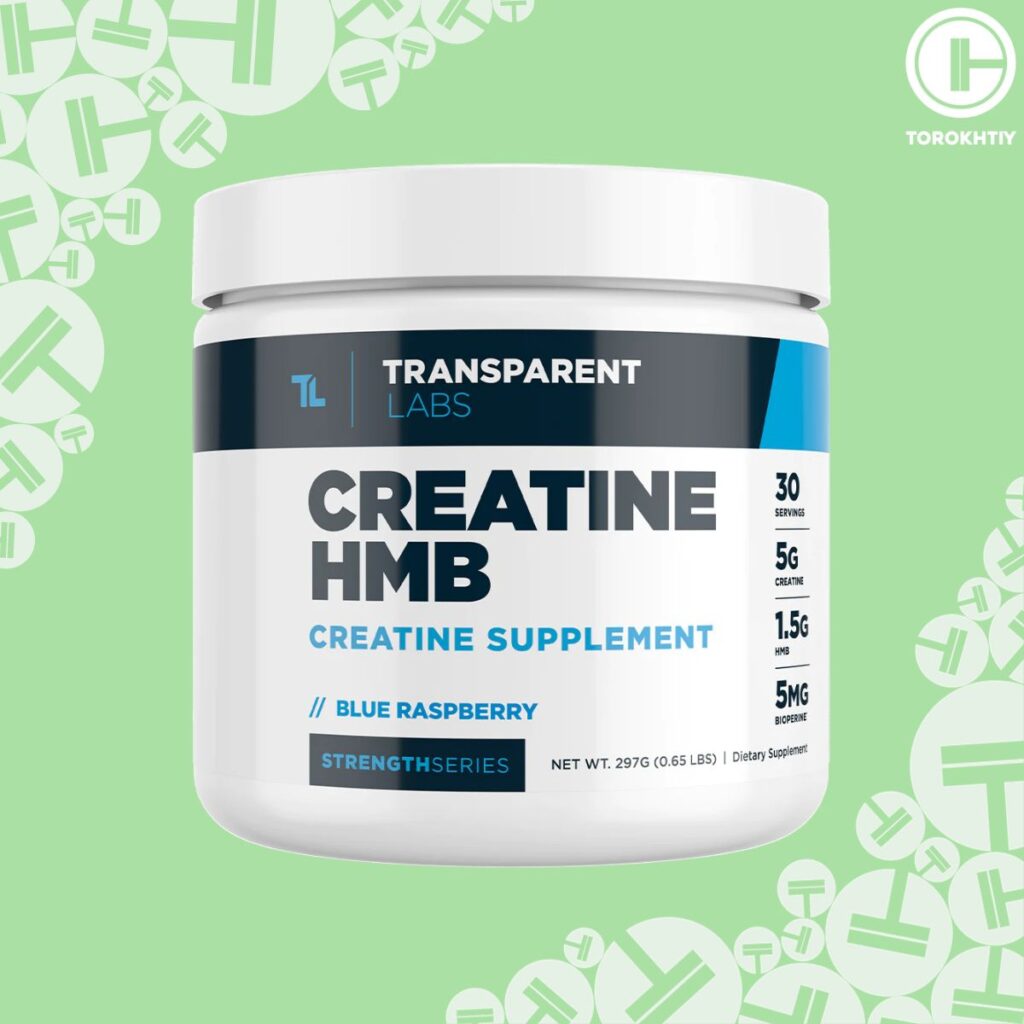
Still have questions after reading our article? Unlock your full potential by engaging with our experts and community! Don’t hesitate — leave a comment below and David Sasha Schulz will provide a personalized answer and insights to help you reach your goals.